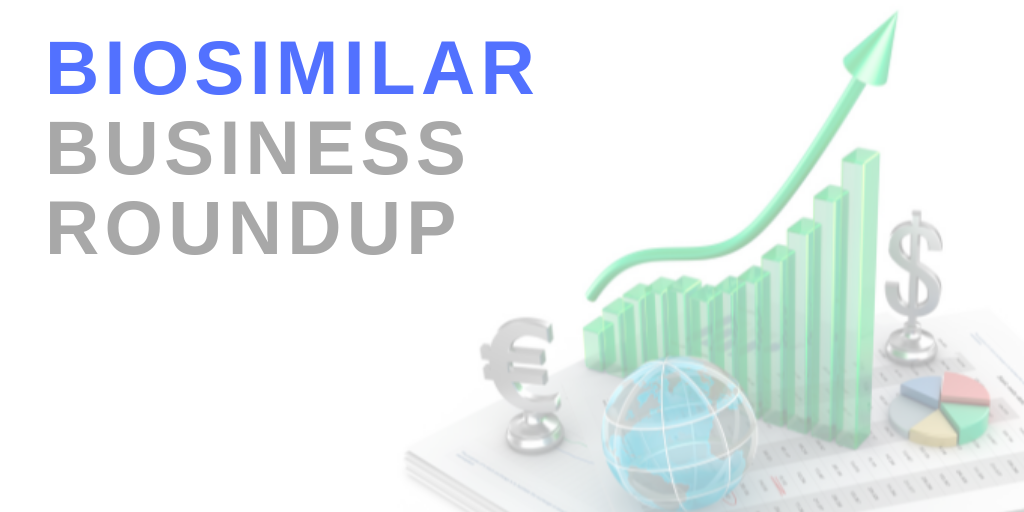- Bone Health
- Immunology
- Hematology
- Respiratory
- Dermatology
- Diabetes
- Gastroenterology
- Neurology
- Oncology
- Ophthalmology
- Rare Disease
- Rheumatology
Biosimilars Business Roundup: October 2023
Between 3 regulatory approvals, 2 complete response letters, and new data and industry insights, October brought a number of business updates that have the potential to impact the entire US biosimilar industry.

Between 3 regulatory approvals, 2 complete response letters, and new data and industry insights, October brought a number of business updates that have the potential to impact the entire US biosimilar industry.
Regulatory Approvals
The FDA approved Celltrion’s Zymfentra (infliximab-dyyb), a subcutaneous infliximab product based on Inflectra (also infliximab-dyyb), an intravenous infliximab biosimilar by the same company. The approval marked the first subcutaneous infliximab to be approved in the United States.
Zymfentra was approved as a novel drug because the reference product Remicade does not have a subcutaneous option, meaning that Zymfentra is not a biosimilar despite its relation to Inflectra. The approval was based on data confirming Zymfentra’s superior clinical effects to placebo in patients with ulcerative colitis and Crohn disease.
Additionally, 2 biosimilars gained an interchangeability designation: Abrilada and Byooviz.
Abrilada is the second adalimumab biosimilar to be deemed interchangeable, following Cyltezo. The label will allow for Abrilada to be exchanged for the reference product (Humira) or another adalimumab biosimilar at the pharmacy without having to wait for a physician to approve the change. The approval was based on data from a switching study that confirmed that multiple switches between the reference product and biosimilar was safe and did not impact clinical outcomes.
Byooviz is the second ranibizumab biosimilar to have an interchangeable designation, with Cimerli being the first. Ranibizumab products are ophthalmic treatments administered intravitreally, which carries a low risk of immunogenic response. Therefore, the FDA was able to grant Byooviz interchangeability without requiring a switching analysis.
Other Business News
Boehringer Ingelheim launched an unbranded version of its adalimumab biosimilar Cyltezo at an 81% discount to the originator (Humira). The company’s branded version is priced at only 5% less than Humira. The dual-pricing strategy has become popular among adalimumab biosimilar manufacturers, with 3 other adalimumab biosimilar launching with 2 wholesale acquisition costs. Experts claim that the strategy is intended to convince pharmacy benefit managers to put their products on formulary while maintaining significant discounts for uninsured or underinsured patients.
The FDA also issued 2 complete response letters (CRLs): one of Biocon Biologics’ insulin aspart biosimilar and one for Alvotech’s ustekinumab biosimilar candidate.
Both CRLs were issued due to deficiencies during the FDA’s manufacturing facility inspections and not with the products themselves. Alvotech said the letter was not a surprise because they’ve received multiple CRLs citing similar issues for its adalimumab biosimilar candidate.
Biocon and Alvotech have expressed that they will continue to pursue FDA approval and they are working to comply with FDA’s requests.
Conference Coverage
Around the same time as the Byooviz approval, Celltrion released update data from its phase 3 LIBERTY trials assessing the use of Zymfentra, also known as CT-P13 SC, in patients with inflammatory bowel disease at the United European Gastroenterology Week 2023. The study results demonstrated that CT-P13 SC has a similar safety profile to the placebo during the 54-week maintenance period.
At EURETINA 2023, the annual meeting of the European Retina, Macula and Vitreous Society, Samsung Bioepis shared data from a phase 3 study that demonstrated comparable safety and efficacy between SB15, the company’s aflibercept biosimilar candidate, and Eylea, the reference product in patients with neovascular age-related macular degeneration.
The news came shortly after the European Medicines Agency granted marketing authorization to Biocon Biologics’ Yesafili as the first aflibercept biosimilar in September 2023.
During the AMCP Nexus meeting, experts discussed the growing US biosimilars industry, highlighting its progress since 2020, particularly in the medical benefit sector. Collaborating with payers, optimizing electronic health records, and clear communication with prescribers were identified as key strategies for successful biosimilar integration. The regulatory framework for biosimilars was also discussed, emphasizing the importance of decreasing reliance on comparative efficacy studies in favor of alternative analyses. Stakeholder engagement and efforts to include voices of smaller and less experienced developers were also highlighted.
Newsletter
Where clinical, regulatory, and economic perspectives converge—sign up for Center for Biosimilars® emails to get expert insights on emerging treatment paradigms, biosimilar policy, and real-world outcomes that shape patient care.
